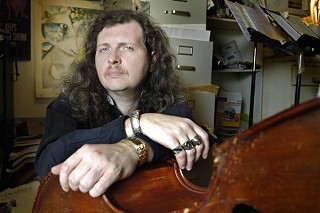The Music Is Pretty Much Incessant
P. Kellach Waddle, the River City's 'educated hillbilly,' composes himself a life
By Wayne Alan Brenner, Fri., April 20, 2007
Take a good look at the Austin-based classical composer P. Kellach Waddle. His long hair curls down in a ginger chaos, obscuring the tops of his posh jacket's lapels; his right hand, pale fingers bright with silver rings, rests lightly on the neck of his upright bass; his blue eyes focus on the middle distance before him, perhaps seeing phantoms of musical notation yet to come. Waddle, just recently turned 40, has written at least one major solo chamber work, prominent chamber music part, or concerto for every standard orchestral instrument except timpani. His works have been performed in 38 states and in 14 countries on four continents. He's been twice nominated for a Pulitzer Prize. Who among us would call this man an educated hillbilly?
He would.
"Well, I grew up in Louisville, Kentucky, so there's the accent," says Waddle, providing instant proof. "And my grandparents are very upper-middle-class, but I can remember when they got an indoor bathroom. I was 3; I remember it vividly. And it wasn't because they'd been lacking the means; they were never of any sort of poverty. They just lived someplace that was obscure enough that there was no city waterline to their part of the county until 1970. And if I can go just one generation back to the dawn of indoor plumbing, well, I think that qualifies for educated hillbilly.
"And me and my parents were the first people in my family to ever go to college. I mean, anybody could have a 183 IQ and do some of the things that I've been blessed enough to do, but how many of them can remember when their family got indoor plumbing? And how many classical musicians are there who weren't raised in rural environments, who could shoot a rifle when they were 3 years old? Or went out hunting squirrels and rabbits? You just don't see that very often, and I think it makes for an interesting dichotomy."
It's been decades now since Waddle's shot lead into any of our woodland pals. These days, he's too busy playing bass with the Austin Symphony Orchestra or performing at an Alamo Drafthouse music-and-a-movie presentation or attending a performance of his and others' works for UT's bell tower or working on a commission for the Contemporary Youth Orchestra of Cleveland or sitting in with the classically oriented Golden Hornet Project or any number of things. But what is it that causes a rifle-toting, outdoor-plumbing-using child, upper-middle-class or not, to move from Remington to Stradivarius, from bagging game to bowing strings?
"Well," recalls Waddle, "when my parents first did all the tests on my little freak-genius self, like when they figured out that I was reading at 19 months and things like that, it was just the normal response of 'Oh, smart little kids need to do all these things; you need to take music lessons, too.'
"But, growing up, I was very invertedly ignorant. I mean, when I was 7, I didn't know that every 7-year-old wasn't reading The Godfather – that was the year after it came out. I didn't know that other 7-year-olds, some of the time, couldn't even read yet. I thought what I did was what everybody was doing. But I first started playing music, taking lessons, when I was 9. And I wasn't intent at all, at that time, on being a career musician.
"And, you know, my parents never dreamed in a million years that I'd become a professional musician. Because when you have a child with that kind of IQ, you have these ideas of brain surgeon or Harvard Law president at 24 and things like that. But I got more and more into music, and about the time I was 13, I decided that this was what I was going to do."
At 17, the native Kentuckian was playing with the Bowling Green Symphony; at 19, the Lexington Symphony.
And now, 27 years after his youthful decision, after college degrees in art history and bass composition and performance (with minors in opera history and cognitive linguistics), after a myriad of professional orchestral gigs, after performances at major music festivals around the world, a 1992 move to Austin, and don't forget those two Pulitzer nominations: Is this talented and busy man actually making a living in his chosen field?
"Depends on what week you ask me," he says, laughing heartily. "In all seriousness, though, every year it does get better, and every year there are more commissions, and there are raises, and there are freelance opportunities and people asking me to do sideline things. I got a commission from the Miró Quartet recently, and that was a big chunk of change. And some of the Alamo shows do really well. So it's getting better, but I have no shame in telling you that, for the amount of work I do, yes, I am still quite below the poverty level. So, depending on paycheck circumstances, if I didn't have a saintlike mother who still helps out and didn't come from a family who is far from wealthy but very, very upper-middle-class, I'd be ... well, waiting tables or something." A smile blooms below his ruddy mustache. "Being in Austin helps, too."
Due to, what, city funding?
Waddle shakes his head, his curls shifting like soft springs of dirty copper. "Because of the same cliché things that people always say about Austin," he says. "The vibe is so much cooler, the people are cooler, it's big and little at the same time. Just the glory that is Austin, pretty much. In other cities, especially in New York and Boston and such, there's far too much competition. Those other places are certainly cultural hubs and also wonderful places for doing something like we're doing, but there are, like, these fences. It's not as much a part of the everyday person's vibe and culture the way it is in Austin, and the musicians are fighting so much harder to get any audience at all. It's like, 'Oh, don't go to so-and-so's thing; go to my thing.' And here we're more like, 'Oh, go to all of our stuff.' We're very, very fortunate to be in a place where the vibe is like that. As much as you get used to it after a while and you gripe about certain things, we're really lucky to live here."
P. Kellach Waddle – the daytime-TV aficionado who supported himself for two years by writing synopses for Soap Opera Weekly, the man whose longtime apartment is chockablock with collections of vintage board games and clocks and coffee cups and lighters and quilts ("I have, like, 10 Monopoly quilts and three Gone With the Wind afghans"), the self-proclaimed educated hillbilly who nonetheless never liked to fish ("It just involved far too much sitting for me, just sitting and waiting and nothing's happening, and I was bored out of my skull") – thinks we're lucky to live here.
Many people who aren't involved with, or even particularly aware of, the classical community would agree, and many of them would mention the Alamo Drafthouse Cinemas, those local temples of eclectic moviegoing goodness, as one of the reasons for Austinites' good fortune. And the manic maestro has, of course, become a cherished part of the Alamo's offerings.
"I went to undergrad school in Houston," says Waddle. "And Houston is, and you can quote me on this, one of the most horrible cities on the face of the universe. But the one good thing about going to school there – a magic, serendipitous thing – was that [Alamo owner] Tim League and I lived in the same dorm. And so did Karrie, before she became Karrie League. So I knew them for years. And I always talked to them about movies and weird taped collections of commercials and shit, because we were like the only three people in that dorm who were into that kind of stuff. But, back then, there was no hint that it was gonna be their life or anything.
"And after graduation I lost touch with them for a while, actually, because I was so busy with school at UT and everything. And then I went to the opening of the South Lamar location, and I talked to Tim about the idea of live chamber music there. And one of the most amazing things about Tim, and why the Alamo is so successful, is that, even if it's going to be a disaster two or three times, he's open to anything that sounds sort of cool. So I pitched three movies to do live music with, and he was like, 'Oh yeah, let's do that, and if these three are big failures and we're losing money, maybe you can come up with something else.'
"So the 'Music & a Movie' series was a sort of experiment. And our goal for Amadeus was to sell at least half the seats. And it was oversold by 32 seats, and there were people in the aisles, and we had to turn away 70 people. And then Immortal Beloved was almost that big, too. And that's when Tim said, 'Evidently we have something here. So it's a series now.'"
The next thing Waddle's working on for the Alamo, for a new string quartet called Atlanta Burning, will accompany their presentation of Gone With the Wind. Also imminent is an oboe concerto for an oboist in Albuquerque, N.M., a trombone concerto for a friend at Baylor, an all-Faulkner and an all-Hemingway program for his ongoing Library Concert series in Austin, and a few mixed-instrument pieces that he wants to premiere in New York next year.
"And there's always new bass music in the pipeline," says the composer, adjusting one of the school rings on what he calls his Hand o' Academia. "There's music going through my head 24/7. It's kind of like having cable channels in your brain, and there's music going on in all of them, and you have to turn a lot of them down, sometimes, but they're still all going. Especially if I'm writing a big piece, an orchestra piece. Or if I have to write four pieces in three days, there are times, well, all of my friends have voice mails from me during these times, after I've written, like, 40 pages in 14 hours. And I'm a little bit nuts. Not necessarily mean nuts or bad nuts, but there are messages that are no more than hysterical laughter, and nobody knows what I'm laughing at. Or I've sent e-mails where I give people links to Sesame Street songs, with all the lyrics, and I'm like, okay, sing this with me. Crazy stuff, at those times. But, yeah, the music is pretty much incessant." ![]()










